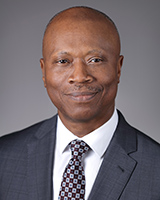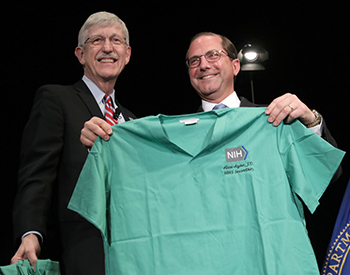News Briefs
Clinical Center’s New Chief Operating Officer: Pius Aiyelawo

PHOTO BY ERNIE BRANSON, NIH
Pius Aiyelawo joined NIH, in April, as the Clinical Center’s new chief operating officer.
Retired U.S. Navy Captain Pius Aiyelawo began his tenure on April 2, 2018, as chief operating officer (COO) of the NIH Clinical Center. Aiyelawo fills a role newly expanded to include management of most clinical as well as administrative areas. He reports directly to Chief Executive Officer James K. Gilman.
“Pius’s tremendous health-care leadership experience is matched only by a positive energy and spirit that will inspire both patients and staff,” said Gilman. “After a very competitive national search, I am convinced he is the right person to help us raise the bar ever higher in delivering safe, high-quality patient-centric care.”
Aiyelawo held senior leadership positions in hospitals and large medical research programs throughout a distinguished military career spanning over 27 years. His most recent appointments included being assistant deputy director, Research and Development, U.S. Navy Bureau of Medicine and Surgery (Falls Church, Virginia) and COO/deputy commander of Naval Medical Research and Development Command (Fort Detrick, Maryland). He has also served as the commanding officer of the Navy’s largest health-care facility—U.S. Naval Hospital (Okinawa, Japan)—where he led the successful planning, transition, and relocation to a new $650 million hospital complex.
Aiyelawo’s awards include the Legion of Merit with two gold stars, Defense Meritorious Service Medal, Navy Meritorious Service Medal with two gold stars, Navy Commendation Medal with one gold star, Navy Achievement Medal, and service and unit awards.
After his retirement from the U.S. Navy in 2013, Aiyelawo served as a senior program director at General Dynamics Health Solutions (Silver Spring, Maryland). He has taught health-care courses throughout the world. Since 2014, he has served as an adjunct assistant professor of Preventive Medicine and Biometrics at the F. Edward Hebert School of Medicine, Uniformed Services University of the Health Sciences (Bethesda, Maryland).
Aiyelawo holds a B.A. in management science from Alaska Pacific University (Anchorage, Alaska) and an M.P.A. from the University of Alaska (Anchorage, Alaska). He is a fellow in the American College of Healthcare Executives, on the Board of Directors for HelpAge USA, and a member of the Society for International Development.
“I am grateful to the NIH senior leadership and Dr. Gilman for this opportunity and truly humbled to be selected as the chief operating officer of the finest and premiere research hospital in the world,” Aiyelawo said.
Town Hall with NIH and HHS Secretary Azar

PHOTO BY: ERNIE BRANSON
Alex Azar II, the HHS secretary, visited NIH recently. Collins presented him with a set of green, NIH-emblazoned surgical scrubs.
Less than two months after he was sworn in as the United States Secretary of Health and Human Services (HHS) on January 29, 2018, Alex Azar II visited the NIH Bethesda campus. On Tuesday, March 20, he met with institute directors and investigators, visited patients, and participated in a town hall meeting with NIH Director Francis Collins and the NIH community.
During the town hall, Azar, who is a lawyer and former drug-company executive, described his experience working with the NIH through his roles as general counsel for HHS (2001–2005) and as HHS deputy secretary (2005–2007) in the Bush Administration. As deputy secretary, Azar helped improve the department’s operations; advanced its emergency preparedness and response capabilities as well as its global-health affairs activities; and oversaw the rollout of the Medicare Part D prescription-drug program. He returned to the private sector in 2007.
Azar went on to emphasize his four priorities as HHS secretary: reducing drug prices; fixing the health-insurance market to make it more affordable; using the power of Medicare to try to drive the value-based transformation of our health-care system; and tackling the opioid crisis.
He also answered questions that had been submitted in advance by members of the NIH community and selected by Collins. Following are edited highlights:
Collins: Your predecessors had to deal with pandemics such as H1N1 flu, Zika virus, etc. Are we ready for a new pandemic?
Azar: We can make sure our general systems of preparedness are as good as they can be. HHS now is much better prepared for a new health crisis than we were post-9/11, which was chaotic with anthrax fears, the flu crises, etc. I told former HHS Secretary Tom Price to always leave an empty checkbox on your priority list for something you cannot prepare for or predict.
Collins: The empty box may be opioids. What are your views on medication assistance programs (MAT) for opioid abuse?
Azar: We need to treat opioid addiction as a medical condition, not a “moral failing,” and we must use the latest research to address it. MAT is one way. It looks to be highly effective, and we should strive to optimize and improve its implementation. We also need to consider that community-based care and rehabilitation can be just as effective as inpatient care. My hope is that this week Congress will approve the omnibus spending package, which includes $3 billion—$500 million of which will go to NIH for opioid-addiction research—that will go toward addressing the opioid crisis in 2018.
Collins: What are your thoughts on gun-violence research?
Azar: There is a broad misunderstanding around the Dickey Amendment (legislation that prohibits the use of federal funds to advocate or promote gun control). We are not allowed to appropriate funding toward advocating firearm regulation, but that does not mean we cannot conduct research on gun violence. Mental illness is one of the most important considerations to pursue when understanding gun violence. I believe the NIH is critical in performing research in identifying ways to treat mental illnesses as part of its role in performing work for the common good.
Collins: How do you sleep at night with all that is in your purview?
Azar: My job is not to solve a crisis but to have a team that can. It’s like conducting an orchestra—getting the musicians to perform their best and act as a team. That makes you sleep better at night.
After the session, Collins presented Azar with a set of green, NIH-emblazoned surgical scrubs. “Just what the world needs,” Azar said with a laugh, “a lawyer in the OR.”
To watch a videocast of the town hall (NIH and HHS only), go to https://videocast.nih.gov/launch.asp?23769.
This page was last updated on Thursday, April 7, 2022
